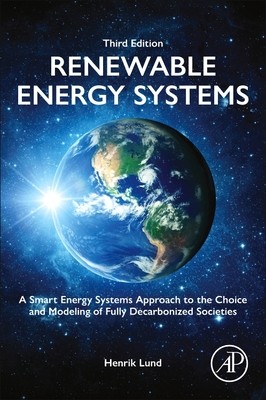
- We will send in 10–14 business days.
- Author: Henrik Lund
- Publisher: Academic Press
- ISBN-10: 0443141371
- ISBN-13: 9780443141379
- Format: 15.2 x 22.9 x 2.2 cm, hardcover
- Language: English
- SAVE -10% with code: EXTRA
Reviews
Description
In this new edition of Renewable Energy Systems: A Smart Energy Systems Approach to the Choice and Modeling of Fully Decarbonized Societies Third Edition, globally recognized renewable energy researcher and professor, Henrik Lund, sets forth a straightforward, comprehensive methodology for comparing different energy systems' abilities to integrate fluctuating and intermittent renewable energy sources and achieve a fully decarbonized society. The book does this by presenting an energy system analysis methodology, providing the results of more than 15 comprehensive energy system analysis studies, examining the large-scale integration of renewable energy into the present system, and presenting concrete design examples derived from a dozen renewable energy systems around the globe. Renewable Energy Systems, Third Edition also undertakes the socio-political realities governing the implementation of renewable energy systems by introducing a theoretical framework approach aimed at understanding how major technological changes, such as renewable energy, can be implemented at both the national and international levels. This is a valuable resource for researchers, scientists, engineers, project managers, policy makers, consultants, and graduate students with an interest in planning, modelling, and implementation of renewable energy systems.
EXTRA 10 % discount with code: EXTRA
The promotion ends in 18d.19:56:50
The discount code is valid when purchasing from 10 €. Discounts do not stack.
- Author: Henrik Lund
- Publisher: Academic Press
- ISBN-10: 0443141371
- ISBN-13: 9780443141379
- Format: 15.2 x 22.9 x 2.2 cm, hardcover
- Language: English English
In this new edition of Renewable Energy Systems: A Smart Energy Systems Approach to the Choice and Modeling of Fully Decarbonized Societies Third Edition, globally recognized renewable energy researcher and professor, Henrik Lund, sets forth a straightforward, comprehensive methodology for comparing different energy systems' abilities to integrate fluctuating and intermittent renewable energy sources and achieve a fully decarbonized society. The book does this by presenting an energy system analysis methodology, providing the results of more than 15 comprehensive energy system analysis studies, examining the large-scale integration of renewable energy into the present system, and presenting concrete design examples derived from a dozen renewable energy systems around the globe. Renewable Energy Systems, Third Edition also undertakes the socio-political realities governing the implementation of renewable energy systems by introducing a theoretical framework approach aimed at understanding how major technological changes, such as renewable energy, can be implemented at both the national and international levels. This is a valuable resource for researchers, scientists, engineers, project managers, policy makers, consultants, and graduate students with an interest in planning, modelling, and implementation of renewable energy systems.


Reviews